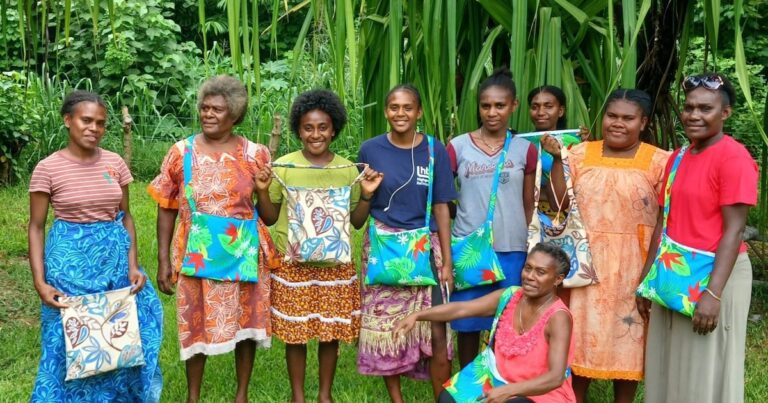October 20, 2025, 7:00 AM MDT
Across the South Pacific, women of The Church of Jesus Christ of Latter-day Saints combine practical skills with gospel-centered service to strengthen families, uplift communities, and share the Savior’s love.
Recent work in Vanuatu, Fiji and the Cook Islands highlights the faith and determination of women to bless others while developing their own talents and abilities.
Sewing lessons bring independence in Vanuatu
When Sister Janet Rose, a humanitarian missionary, started teaching sewing lessons in Vanuatu, she wasn’t sure how the idea would be received. She and her husband purchased 10 electric and two manual sewing machines to start classes in a small community on Efate Island. Eventually, demand became so great that 10 additional machines were needed, the church’s Pacific Newsroom reported.
Women ranging in age from 12 to 70 gathered in classes of up to 20 participants. Starting with simple shoulder bags, it later evolved into skirts, dresses, children’s clothing, and even sanitary napkins, which are often expensive and difficult to find locally.

On Tanna Island, where electricity is limited, women worked together using manual machines, with one person turning the handle and the other sewing.
“They have dreams of sewing to help their families clothe themselves, and perhaps earn a little extra income to survive,” Sister Rose recalled. “This is a great example of a community working towards self-reliance.”
Fiji sisters develop faith and business skills

In Suva, Fiji, 130 women, Church members and friends, participated in the first Relief Society Self-Reliance Workshop held August 25-29. Over five days at Samabula Primary School, the women learned both mental and practical skills to prepare them for small business opportunities and greater family stability.

The classes covered financial literacy, entrepreneurship, marketing, beauty, cake decorating, event planning, tapa printing and early childhood education, according to the church’s Pacific Newsroom.
Sashi Kiran, Fiji’s Minister for Women, Children and Social Protection, attended the graduation ceremony and praised the vision of church leaders, saying, “Just as the leaders[of the Church of Jesus Christ]had a vision to unite many women, I encourage them to build a culture of mutual upliftment.”
Elder Taniela B. Wacolo, a General Authority Seventy and First Counselor in the Pacific Area Presidency, said the week was about more than just learning skills.

“The women of the Pacific are a powerful force for good in families, communities, and the Church. As sisters learn the principles of spiritual and temporal self-reliance, they are equipped to bless generations. We rejoice in their efforts and testify that as they act in faith, the Lord strengthens their ability to lead, nurture, and serve,” she added.
Cook Islands women share Christlike love through newborn packs

In Rarotonga, Cook Islands, Latter-day Saint women prepared and donated 111 newborn packs to families on the remote northern islands of Tongareba, Pukapuka, Nassau, Manihiki and Rakahanga. Each pack contained diapers, wipes, clothing, bottles and other essentials for children ages 0-5.
The packs were presented to government leaders and then distributed to families across the island, the church’s Pacific Newsroom reported.

Local Relief Society leader Pa Tauakume Pepe thanked the women for their efforts, saying, “These acts of kindness not only bring immediate relief, but also foster hope and comfort in those who need it most.”

Tongareba families later sent messages of thanks, with Tongareba MP Sarakula Tapaitau calling the donation “a message of hope and love.”

“Living on the remote island of Tongareba Atoll is a unique and often difficult experience. Simple necessities like diapers and wipes are luxuries that we do not go without. This act has deepened the unity of our community. The generosity of the Church has set us a beautiful example of selfless service and love,” she added.
Relief Society leads the Church’s global efforts for women and children, seeking to bless the lives of women and children under five in particular through the areas of maternal and newborn care, child nutrition initiatives, immunizations, and education around the world.
